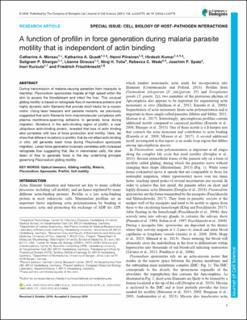A function of profilin in force generation during malaria parasite motility that is independent of actin binding
Moreau, Catherine A.; Quadt, Katharina A.; Piirainen, Henni; Kumar, Hirdesh; Bhargav, Saligram P.; Strauss, Léanne; Tolia, Niraj H; Wade, Rebecca C.; Spatz, Joachim P; Kursula, Inari; Frischknecht, Friedrich
Journal article, Peer reviewed
Published version

Åpne
Permanent lenke
https://hdl.handle.net/11250/2739443Utgivelsesdato
2020Metadata
Vis full innførselSamlinger
- Department of Biomedicine [710]
- Registrations from Cristin [9791]
Sammendrag
During transmission of malaria-causing parasites from mosquito to mammal, Plasmodium sporozoites migrate at high speed within the skin to access the bloodstream and infect the liver. This unusual gliding motility is based on retrograde flow of membrane proteins and highly dynamic actin filaments that provide short tracks for a myosin motor. Using laser tweezers and parasite mutants, we previously suggested that actin filaments form macromolecular complexes with plasma membrane-spanning adhesins to generate force during migration. Mutations in the actin-binding region of profilin, a near ubiquitous actin-binding protein, revealed that loss of actin binding also correlates with loss of force production and motility. Here, we show that different mutations in profilin, that do not affect actin binding in vitro, still generate lower force during Plasmodium sporozoite migration. Lower force generation inversely correlates with increased retrograde flow suggesting that, like in mammalian cells, the slow down of flow to generate force is the key underlying principle governing Plasmodium gliding motility.